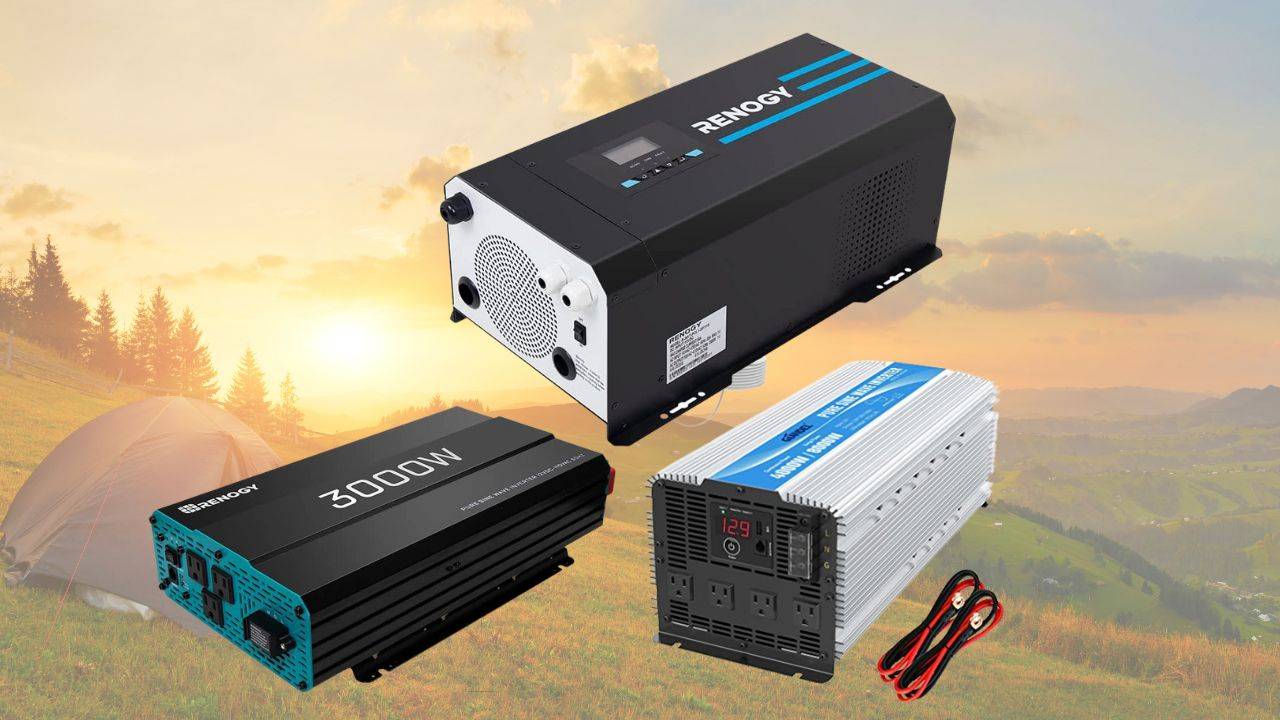Choosing a pure sine wave inverter can feel like navigating a maze of volts, watts, and technical jargon. But if you care about keeping your devices safe and making eco-friendly choices, understanding these power converters is absolutely worth it.
Whether you’re setting up an off-grid solar system, powering an RV adventure, or just ensuring your home backup system runs smoothly, the right inverter makes all the difference. But here’s the thing — not all inverters (or brands) are created equal.
In this comprehensive guide, we’ll break down everything you need to know:
✔️ What is a pure sine wave inverter and how does it work?
✔️ Why it’s better for sensitive electronics and energy efficiency
✔️ Key buying considerations for performance and sustainability
✔️ And a deep dive into brands making waves with ethical manufacturing and durable designs
Let’s decode the tech, spotlight the brands doing good, and help you make a smart, sustainable choice for your power needs.
What Is a Pure Sine Wave Inverter?
A pure sine wave inverter is a device that converts direct current (DC) such as what’s produced by a solar system or RV batteries, to usable alternating current (AC) that most appliances use.
These “pure sine waves” ensure smooth and steady voltage, just like in the power grid. It means you can run your appliances wherever you are. Just plug them in, as you would back at home.
This makes a pure sine wave inverter ideal for people who live off-grid or travel around in their RV.
How Does a Pure Sine Wave Inverter Work?
A pure sine wave inverter converts DC to AC in three steps:
Step 1: Creates Oscillating Pulses
Using integrated electronics, the inverter generates oscillating direct current pulses that simulate positive and negative polarity peaks. But these pulses are too weak, so they need to be amplified.
Step 2: Amplifies the Signal
This stage amplifies the 12V or 24V pulses to high-current levels needed to power appliances. Although already in AC form, the output voltage is still low to run any appliance. This is where a transformer comes into action.
Step 3: Raises the Output Voltage
In the last stage of DC/AC conversion, a magnetic transformer is used to kick up the voltage to 110V or 120V, which your appliances use. In their raw form, these AC voltage sine waves are not true sine waves, but rather jagged and boxy. So, pure wave sine inverters use additional capacitors and filters to make the alternating current “smoother.”
Why Do You Need a Pure Sine Wave Inverter?
You need a pure sine wave inverter if you plan to install solar panels on your roof or RV. Most appliances in your home use AC power, so you need it to convert the DC power that solar panels produce to AC power. It also brings up the voltage to the grid level.
A pure sine wave inverter also saves you money, as it’s much more efficient than the older, jagged wave inverters. The smoothly-changing phase also minimizes the risk of damage to your sensitive electronics.
Top 7 Pure Sine Wave Inverter Brands for Sustainable Power Solutions
1. Renogy: Powering the Future with Clean Energy Solutions
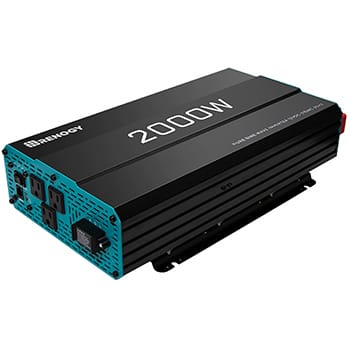
Renogy stands as a beacon in the renewable energy space, crafting solar products designed to empower individuals and businesses toward energy independence. Their line of pure sine wave inverters is no exception—delivering stable, efficient power conversion that supports off-grid lifestyles without environmental compromise.
But Renogy’s mission runs deeper than just product performance. With a core focus on sustainable energy solutions, they prioritize clean, renewable sources to minimize fossil fuel reliance. Their manufacturing practices lean toward durable designs that extend product lifespan, reducing e-waste and replacement cycles.
From solar panels to inverters, Renogy encourages customers to harness the power of the sun, lessening carbon footprints and supporting a decentralized energy future. Whether you’re powering an RV, cabin, or home backup system, Renogy’s commitment to accessible, eco-friendly technology ensures that sustainability stays at the heart of every watt produced.
2. Giandel: Efficiency Meets Environmental Responsibility
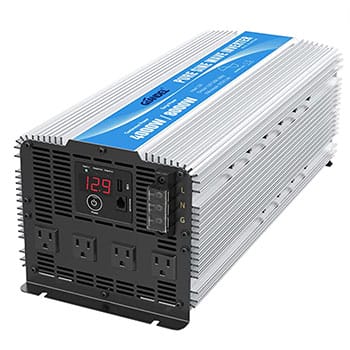
Australian-based Giandel brings over a decade of expertise to the inverter market, specializing in reliable pure sine wave inverters for both consumer and industrial applications. Their hallmark? Energy efficiency paired with affordability.
While Giandel doesn’t lead with green marketing, their focus on high-efficiency power conversion means less energy wasted as heat — a subtle but impactful way to reduce overall power consumption. Their inverters are built to withstand heavy-duty use, ensuring longer product lifespans and fewer replacements over time. That’s a win for both the planet and your wallet.
Giandel also maintains quality control standards that prioritize safety and longevity, reducing the environmental costs tied to substandard electronics. For eco-conscious buyers seeking reliable power with fewer frills, Giandel delivers durable products that quietly support a lower-impact energy footprint.
3. EDECOA: Practical Power with a Nod to Longevity
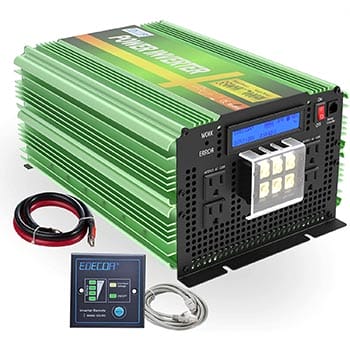
EDECOA offers pure sine wave inverters built for resilience. Their approach to manufacturing emphasizes rugged construction, often designed for vehicles, RVs, and solar setups where dependability is critical.
While sustainability isn’t front and center in their brand messaging, EDECOA’s long-lasting products reflect an anti-throwaway philosophy. By investing in quality materials and robust internal components, EDECOA minimizes premature product failure—a key aspect of sustainable electronics.
This focus on durability supports waste reduction, as fewer inverters need replacing or repairs. For those seeking cost-effective, long-term power solutions that resist planned obsolescence, EDECOA provides a solid option that aligns with practical sustainability.
4. WindyNation: American-Made Off-Grid Innovation
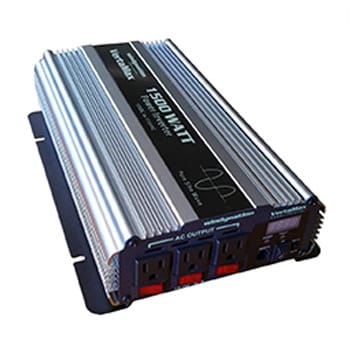
WindyNation is a US-based brand committed to energy independence through renewable power systems, including pure sine wave inverters. Designed with DIY solar enthusiasts in mind, their products promote a hands-on approach to reducing reliance on traditional energy grids.
A standout feature of WindyNation is their local manufacturing presence—keeping production closer to home helps reduce shipping emissions and supports local economies. Their systems are tailored for off-grid living, which inherently promotes sustainability by reducing dependency on fossil fuel-powered grids.
Pairing solar panels, wind turbines, and inverters, WindyNation equips eco-minded consumers with tools to generate and manage renewable power, fostering resilience and a greener lifestyle. Their focus on accessible renewable technology makes them a key player for anyone looking to step lightly on the planet.
5. SL Euthtion: Affordability Meets Functionality
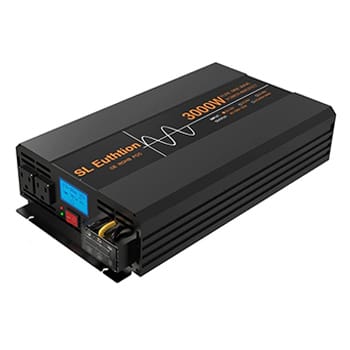
SL Euthtion positions itself as a budget-friendly provider of pure sine wave inverters for small-scale solar and backup power systems. While the brand doesn’t broadcast sustainability initiatives, their accessible pricing and product reliability contribute to a waste-reducing ethos.
By offering affordable power solutions, SL Euthtion helps extend renewable energy access to more consumers—a critical step toward broader adoption of green technologies. Their compact, efficient designs focus on doing more with less, which subtly supports energy conservation.
For those starting their journey into solar power or off-grid setups on a budget, SL Euthtion provides reliable tools that enable more people to embrace eco-friendly energy solutions without breaking the bank.
6. VOLTWORKS: High Performance with an Eye on Longevity
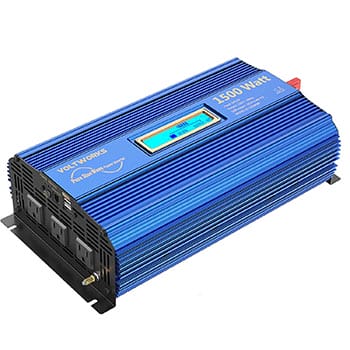
VOLTWORKS delivers pure sine wave inverters designed for consistent performance across diverse applications—from home backups to RV power systems. Their focus? Performance stability and product longevity.
While their sustainability messaging is understated, VOLTWORKS emphasizes build quality, integrating intelligent cooling systems and protection features that extend product life and prevent premature failure. This commitment to durability aligns with the principles of sustainable manufacturing—fewer breakdowns mean fewer discarded electronics.
For consumers who value reliable, long-lasting power conversion, VOLTWORKS presents a smart choice that dovetails with waste reduction and resource efficiency.
7. Novopal: Efficiency for Modern Energy Needs
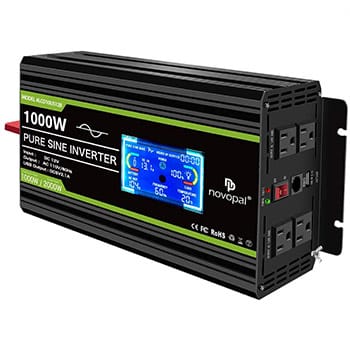
Novopal specializes in pure sine wave inverters tailored for modern applications—whether for vehicles, homes, or renewable energy setups. Their product designs prioritize energy efficiency and compact form factors, making them ideal for space-constrained environments like RVs and tiny homes.
Though not outspoken on sustainability, Novopal’s high-conversion efficiency rates reduce power waste, and their sturdy designs promote extended use cycles. This quiet commitment to product longevity supports a lower environmental footprint.
For tech-savvy users seeking dependable, energy-efficient inverters, Novopal offers a balance of modern design and responsible engineering—helping pave the way for greener energy consumption.
What to Consider Before Buying a Pure Sine Wave Inverter
Wattage
The first thing to consider is the power rating. Check the manuals or spec stickers on the back of your appliances to see how much energy you exactly need.
An inverter of up to 1000W is enough for laptops and phone chargers, gaming consoles, and smaller electronics, while at 3000W you can even plug in the air conditioner or electric chainsaw.
The more the wattage, the more power can the unit convert.
Output Voltage
This one is simple — you need an inverter that’s compatible with all devices you plan to use. Devices sold in the US and neighboring countries need a standard output voltage of 110V or 120V.
Number of Outlets
If you want a powerful pure sine inverter, make sure to choose one that comes with plenty of output ports so you can run or charge multiple appliances at the same time. Apart from having 3 AC outlets, some inverters on the market even have several USB ports.
If you plan to power more demanding appliances, look for an inverter that offers AC terminals so you can hardwire a high-power appliance directly to the inverter mains. It’s much safer that way.
Useful Features
A top-shelf inverter will come with safety features that protect your unit from overheating, over-voltage, short-circuiting, and more.
An LCD display is not a must-have, but it’s nice to be able to read the current energy usage at all times.
Warranty
A solid warranty is a clear message that you’re buying a reliable and quality product from a reputable company that will replace or repair your unit if any issue pops up.
Some manufacturers offer separate warranties for manufacturing and performance.
Pricing of Pure Sine Wave Inverters
- $100 or less: For this money, you can find a decent inverter with a power capacity of 1,000 watts or less. If you need a pure sine unit for your car, there are plenty of affordable options in this range.
- $100-$500 range: This is what you’re likely to pay for most pure sine wave inverters on the market. These usually generate between 1,000 and 2,000 watts, so you can use one to power appliances in your off-grid cabin, RV, or boat.
- $500 and above: This kind of money will get you a heavy-duty inverter with a power capacity from 3,000 to 12,000 watts. These inverters are the most reliable and stable AC units that can easily power a small house.
What Size of Inverter Do You Need?
You need an inverter powerful enough to run the essential appliances, but also to match the energy rating of your solar system.
For example, if you’re going for a 3,000-watt solar system, you should purchase a 3,000-watt inverter.
This wattage, in return, depends on the number and type of appliances you want to run. You can find the power information for most devices on the spec sticker on the backside of the product.
A good rule of thumb is to always choose an inverter with 20% to 50% more than the total power that you need, and with at least twice the power of the largest device you plan to run.
What Can You Run With a Pure Sine Wave Inverter?
With a pure sine wave inverter, you can safely run and charge:
- Sensitive electronics
- Smart devices like smartphones, drones, etc.
- Medical equipment like CPAP machines
- Plasma, LCD, and LED TVs
- Devices with electronic timers or digital clocks
- Appliances with AC motors like fridges and microwaves
- Variable speed tools
- Fluorescent lights
Benefits of Pure Sine Wave Inverters
Stable Power
Pure sine wave inverters produce stable power with low harmonic distortion you can safely use with medical equipment. Such clean power output buys you peace of mind knowing that your expensive devices are safe from power disruptions.
Quieter Operation
As the voltage rises and falls, pure sine waves change their phase angle and polarity smoothly, with no abrupt drops. This reduces the annoying electrical noise coming from fluorescent lights, TVs, stereos, audio amplifiers, answering machines, fans, etc.
High Inductive Loads
Pure sine waves have the same properties as the grid voltage. This makes them perfect for appliances with AC motors, allowing them to use power more effectively. With a pure sine wave inverter, your microwaves, washers, dryers, and refrigerators will operate smoothly, more quietly, and much cooler.
Smooth Output Voltage
A pure sine wave inverter provides smooth output voltage, without choppy drops and surges. This allows your sensitive electronics to operate without glitches, crashes, or strange interruptions. It prevents glitches in computer monitors and weird printouts in laser printers.
Reduced Power Loss
With any power conversion, some energy is inevitably lost. However, a pure sine wave inverter is the most efficient way of converting DC electricity stored in your battery bank to AC electricity.
Disadvantages of Pure Sine Wave Inverters
Price
Pure sine wave inverters cost more than modified sine wave inverters because of the sophisticated technology they use to generate cleaner electrical energy.
The modified sine wave inverters will work just as fine with appliances that don’t need a rectifier and that can be powered by any regular DC adapter.
Power Use
While pure sine wave inverters convert DC energy more efficiently than the other type of inverter, they are also more efficient in depleting your battery bank. The complex circuits plus the transformer means your battery bank charge won’t last as long.
A good rule of thumb is to always choose an inverter with 20% to 50% more than the total power that you need.
Weight
With the voltage transformer onboard, your pure sine wave inverter will weigh more than most modified sine wave inverters, watt-for-watt. Transformers use heavy magnetic cores, and there’s no way around it.
Types of Inverters
Difference Between Standalone Inverters and Inverter Chargers
The standalone inverter is the most common type of power inverter. It basically does just one thing — inverts DC power from your battery into AC power.
The inverter charger, on the other hand, can work as an inverter, transfer relay, and converter/charger — all in one.
Standalone inverters are available in sizes from 75 watts to 5,000 watts, and their price depends on the additional features. You can simply connect it to the battery, or “hardwire” it to use the existing outlets in your cabin, boat, or RV.
Inverter chargers are three-in-one units that automatically “detect” an outside source and go into charging mode. When the internal switch loses the outside power, it automatically returns to inverter power.
Standalone inverters are smaller than inverter chargers, so they’re ideal for camping or in the case of a power outage.
Inverter chargers are much more convenient for RVs or boats in situations when you have the chance to top up your battery from an outside source.
Difference Between Pure Sine Wave Inverters and Modified Sine Wave Inverters
All inverters convert the input DC voltage into sine-wave AC output voltage.
The first inverters, however, didn’t really produce a perfect sine curve, but a rather choppy one called a modified sine wave. These were called modified sine wave inverters.
Their “blocky” AC voltage, however, works fine for simple devices that don’t rely on delicate electronics.
These modified sine wave inverters can be used for older devices such as old tube TVs and motors with brushes.
Pure sine wave inverters are the more advanced of the two, as they produce a more consistent output voltage.
Pure sine wave inverters produce stable power with low harmonic distortion you can safely use with medical equipment.
This makes pure sine wave inverters safe to use with all devices.
If you’re connected to the grid and need an inverter only as a backup supply, you’ll need a pure sine wave inverter, because utilities provide pure sine wave voltage.
On the other hand, if you need to power an off-grid cabin with simple appliances, modified sine wave inverters will work fine and cost you less.
How To Convert a Modified Sine Wave Inverter/Square Wave Inverter to a Pure Sine Inverter
If you need clean sine AC voltage but don’t want to spend a lot, you can convert an old modified sine wave inverter to a pure sine wave operation.
Find a used modified sine wave inverter online for cheap, and this video tutorial can become your next DIY project.
Frequently Asked Questions (FAQ)
Yes, you need a pure sine wave inverter for medical equipment, AC motors, bright fluorescent lights, and audio systems.
Renogy makes the best pure sine inverters. Their products are well-made and reliable, which has been proven in both our tests and other users’ testimonies.
No, a modified sine wave inverter won’t damage your TV. However, you may experience interference, glitches, or audible noise when powering your TV with it.
The most trusted pure sine wave inverter brands are Renogy, Giandel, and EDECOA. Their products may seem more expensive upfront but are packed with useful functions and safety features.
Conclusion: Power Smarter, Live Greener
From the science behind pure sine wave inverters to the brands crafting them with care, it’s clear that choosing the right inverter goes beyond specs. It’s about investing in safe, reliable power that supports your lifestyle—whether you’re chasing sunsets in an RV, living off the grid, or just prepping for the unexpected.
But it’s also about something bigger: supporting brands that prioritize durability, energy efficiency, and sustainable practices. The right inverter not only powers your devices but also helps reduce e-waste, conserve energy, and shrink your carbon footprint.
So as you explore your options, remember: choosing quality and ethics over short-term fixes makes a lasting impact—for you and the planet.
Ready to power up the sustainable way? Let’s get started.

